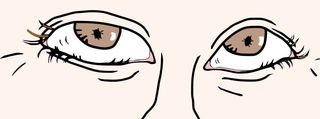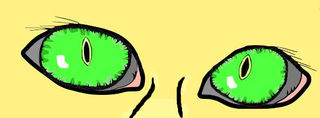Fear
Do You Feel Like You're Always Being Watched?
Some of us were observed too intently, too constantly, when we were young.
Posted August 29, 2018 Reviewed by Gary Drevitch
Throughout the day and night, do you get the sense that you're being spied upon? Scrutinized? Surveilled? By eyes you can or cannot see? Do you feel that your every move is monitored as are those of catwalk models, actors, captives, slaves and prey: that all-devouring gaze, waiting for ... what?
Do you feel watched while facing challenges — giving recitals, taking tests — but also under ostensibly casual conditions: eating, reading, dressing, driving?
Do you feel observed in public, as if every sidewalk was a stage? Also in private, even in your most intimate moments, as if walls had eyes?
You do? Me too.

A 1906 psychiatric journal first used the term "scopophobia" to describe a "morbid shamefacedness" and a "morbid dread of being seen." A scopophobic person typically "covers the face with her or his hands" and "will shun the visitor and escape from his sight where that is possible."
OK. Expand the fear of being seen by those whom we see seeing us to include the even-more-irrational fear that we are always seen, everywhere, even when alone.
In some of us, this fear results from having been watched too much, too intently, when we were too young.
It wasn't just the plain weirdness of being watched, but why our watchers watched us:
They made us believe that, unwatched, we would shame ourselves, shame them, blunder, or die.
They said that the second we slipped out of sight, we would wet our pants, have seizures, shoplift.
They said they could see through walls and straight into our minds.
They watched us bathe and sleep. Somehow, we'd forfeited our right to privacy.
Hold still. Have you gained weight? Is that a pimple or a deadly parasite?
Sometimes they watched us by themselves. Sometimes they put us on display.
See how pretty his hair is? Should she play with that? Show everyone your little dance! Doctor, examine her!
Maybe our over-watchers meant well. Maybe not. We hated being their center of attention, pet, clown, suspect, specimen.
Overexposed, some of us hid under huge clothes, blank faces, blocked-off minds. Some of us cloaked ourselves in rituals and chemicals.
Some of us lost all faith in subterfuge and lived as if in zoos — perpetually naked and afraid.
And so some of us stay, forever facing huge imaginary microscopes and telescopes and magnifying glasses held by nonstop watchers real and theoretical. Caught in this fantasy, we walk and talk as if on film. We duck past shiny surfaces, assuming they are two-way mirrors. We dart down streets and aisles as if searchlights hounded our heels.

We sit and stand stiffly, like dolls waiting to be picked up and repositioned. Our every hello feels like an interview. We tiptoe everywhere, like trespassers.
We constantly interrogate ourselves: Should I smile? How dare I wear hats? Is this a skit? A sin?
But wait. We are not silly weirdos but survivors of surveillance. Our watchers were home-invasion robbers who entered our premises and stole our privacy, turning innocent observation — Hello there! — into trauma. Peekaboo became PTSD.
By watching us too much, they made us believe to this day that our words, thoughts and actions are not really ours, that they remain unworthy and unfinished until they are seen, gauged, and graded by real or spectral spectators.
We must remind ourselves a million times until it sticks: No one is watching me. No one, that is, besides actual pals, pets, passersby. Those other eyes out there have so many more interesting things to see.


